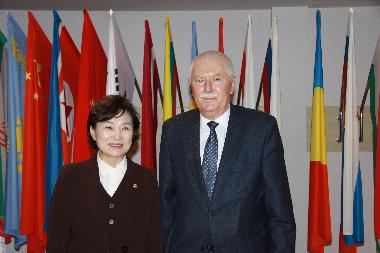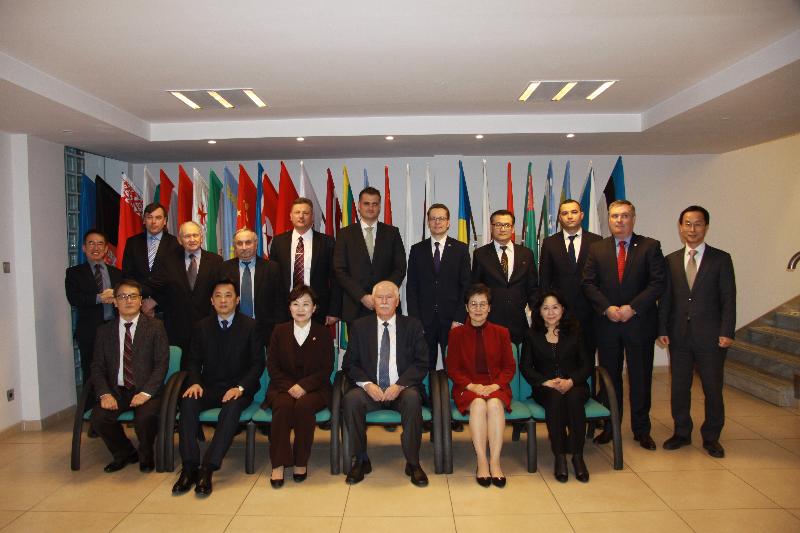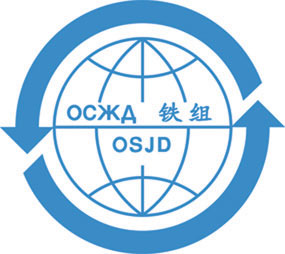Visit of the delegation of the Republic of Korea to the OSJD Committee (press-release)



Opening the meeting, Tadeusz Szozda warmly welcomed the guests and congratulated on the beginning of cooperation of the Republic of Korea in its new status as a full member of the Organisation within the framework of OSJD, noting that the decision on the Republic of Korea’s membership was made recently - in June 2018 during Session XLVI of the Ministerial Conference in Kyrgyzstan.
Further on, the OSJD Committee Chairman informed the guests about the OSJD history, structure and current activities, which are aimed at the development of international passenger and freight railway traffic between Asia and Europe. He particularly dwelt on the aspects of international transport law - the SMPS and SMGS agreements and other documents being applied within the OSJD framework, application of the unified CIM/SMGS consignment note, work on the development of the Convention on Direct International Railway Traffic, activities to improve 13 OSJD railway transport corridors, etc.
Speaking about the advantages of railway transportation from China and Korea to Europe, Tadeusz Szozda noted that the goods in this direction can be delivered in just 14–17 days (using the project “Transsib in 7 days”), against 30-45 days – for the transportation by sea. He particularly expressed his satisfaction with the opened positive dialogue between the two states of the Korean peninsula and the prospects for the resumption of railway traffic between the two countries, which contributes to the organisation of direct traffic from and to the Republic of Korea through the DPRK railway network.
Tadeusz Szozda also welcomed the appointment of two representatives of the Republic of Korea for work in the OSJD Committee since 2019.
The Minister of Land, Infrastructure and Transport of the Republic of Korea, Ms. Kim Hyun-mee, expressed her satisfaction with her country’s membership in the OSJD and showed her confidence that the upcoming CGD meeting in Seoul will further expand cooperation not only in the region, but throughout the whole Eurasian continent.
Deputy Chairman of OSJD Committee, Mikhail Vsevolozhskiy, informed the guests about the work carried out within the OSJD framework for training / training railway personnel with a view to creating an OSJD Academy. In this regard, he noted, it is very important and timely to hold a seminar at the end of February 2019 in Seoul with the participation of specialists from the OSJD Committee on training South Korean specialists in the knowledge and application of key documents operating within the Organisation.
The Secretary of the OSJD Committee Attila Kiss addressed issues related to the organisation and holding of meeting XXXIV of the Conference of General Directors (Authorised Representatives) of the OSJD Railways in the Republic of Korea from 8 till 12 April 2019.
The Chairman of the OSJD Commission on Transport Law, Nikolay Nosenko, informed the guests that the SMPS and SMGS agreements are public documents that are posted on the OSJD website and contain information on the formalities for implementing the procedure for joining the Republic of Korea as a Party to those agreements.
The Chairperson of the OSJD Commission on Freight Traffic, Zubaida Aspayeva, noted that the Korean National Railway Corporation (KORAIL) is possessed of an extensive experience in organising and implementing passenger traffic, including high-speed, as well as freight traffic, and, having the status of an OSJD affiliated enterprise in the past, has been taking active Participation in the OSJD work for many years. This was evidenced by the largest event in the field of railway transport of a world scale, organised in the Republic of Korea in May 2015 - the OSJD Railway Summit and the 10th OSJD High-Level International Freight Conference. She noted that the entry of the Republic of Korea into OSJD will contribute to further development of railway transport in the region, the socio-economic prosperity of the countries and the establishment of cultural exchange between the nations.
In conclusion, the parties noted the need for further development of cooperation within the OSJD framework in order to establish a sustainable railway connection on the Korean Peninsula and in the OSJD area as a whole.
